Clinical Leadership in Nursing: Theories and Practice
VerifiedAdded on 2023/01/17
|12
|3108
|56
Essay
AI Summary
This essay delves into the critical role of clinical leadership in contemporary nursing, examining its importance within the healthcare system. It begins with an introduction emphasizing the challenges faced by clinical leaders due to evolving patient expectations and healthcare demands. The essay then analyzes an interview with a newly appointed nurse leader, connecting her leadership traits to established theories such as the Great Man Theory and the Big Bang Theory, while also exploring her democratic leadership style. It applies various leadership theories, including situational leadership, to the nursing context, highlighting the need for adaptability and empowerment. Furthermore, the essay emphasizes the significance of motivation and effective communication in fostering a positive and productive work environment. In conclusion, the essay underscores the vital impact of effective clinical leadership on patient care and overall healthcare outcomes.
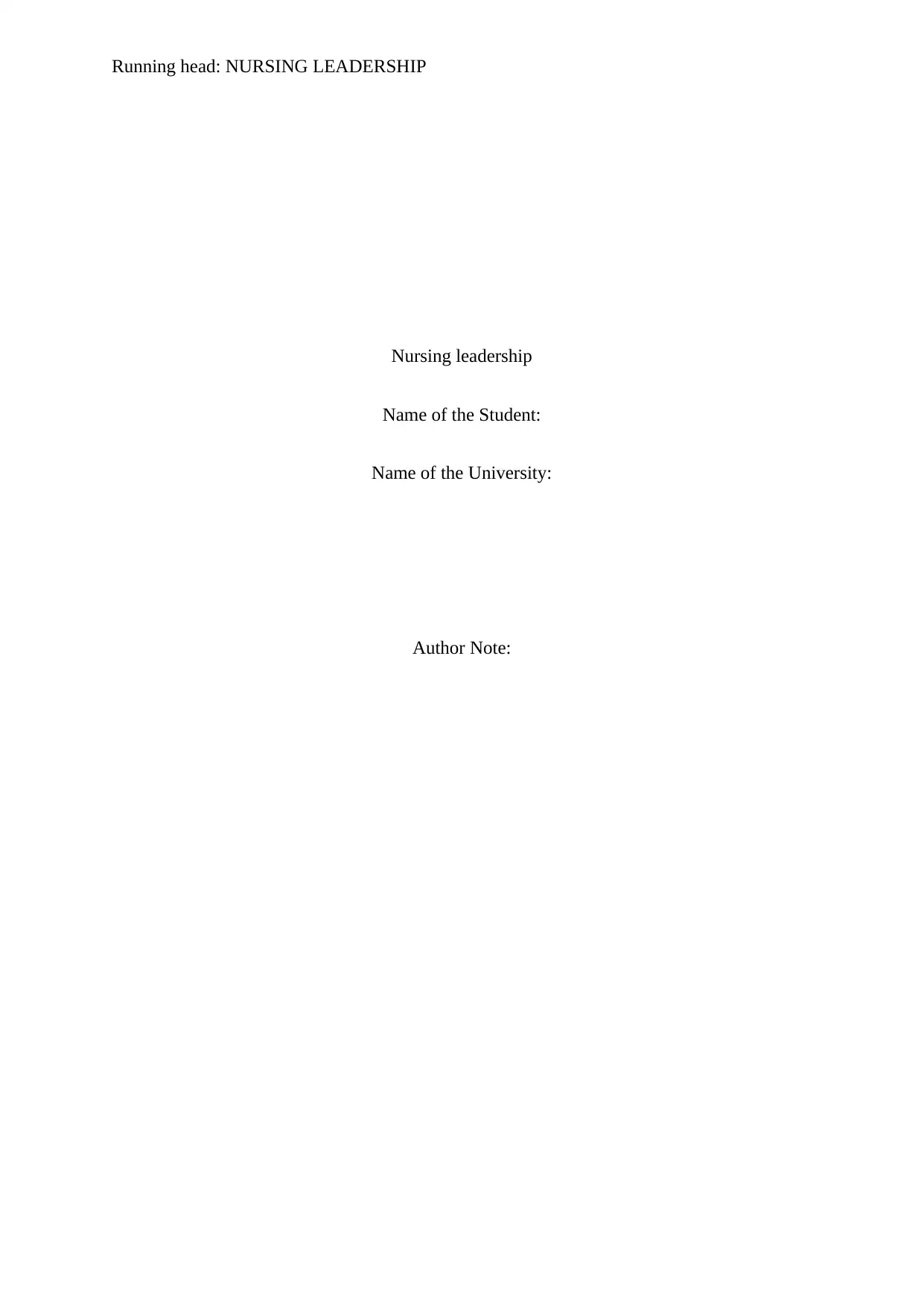
Running head: NURSING LEADERSHIP
Nursing leadership
Name of the Student:
Name of the University:
Author Note:
Nursing leadership
Name of the Student:
Name of the University:
Author Note:
Paraphrase This Document
Need a fresh take? Get an instant paraphrase of this document with our AI Paraphraser
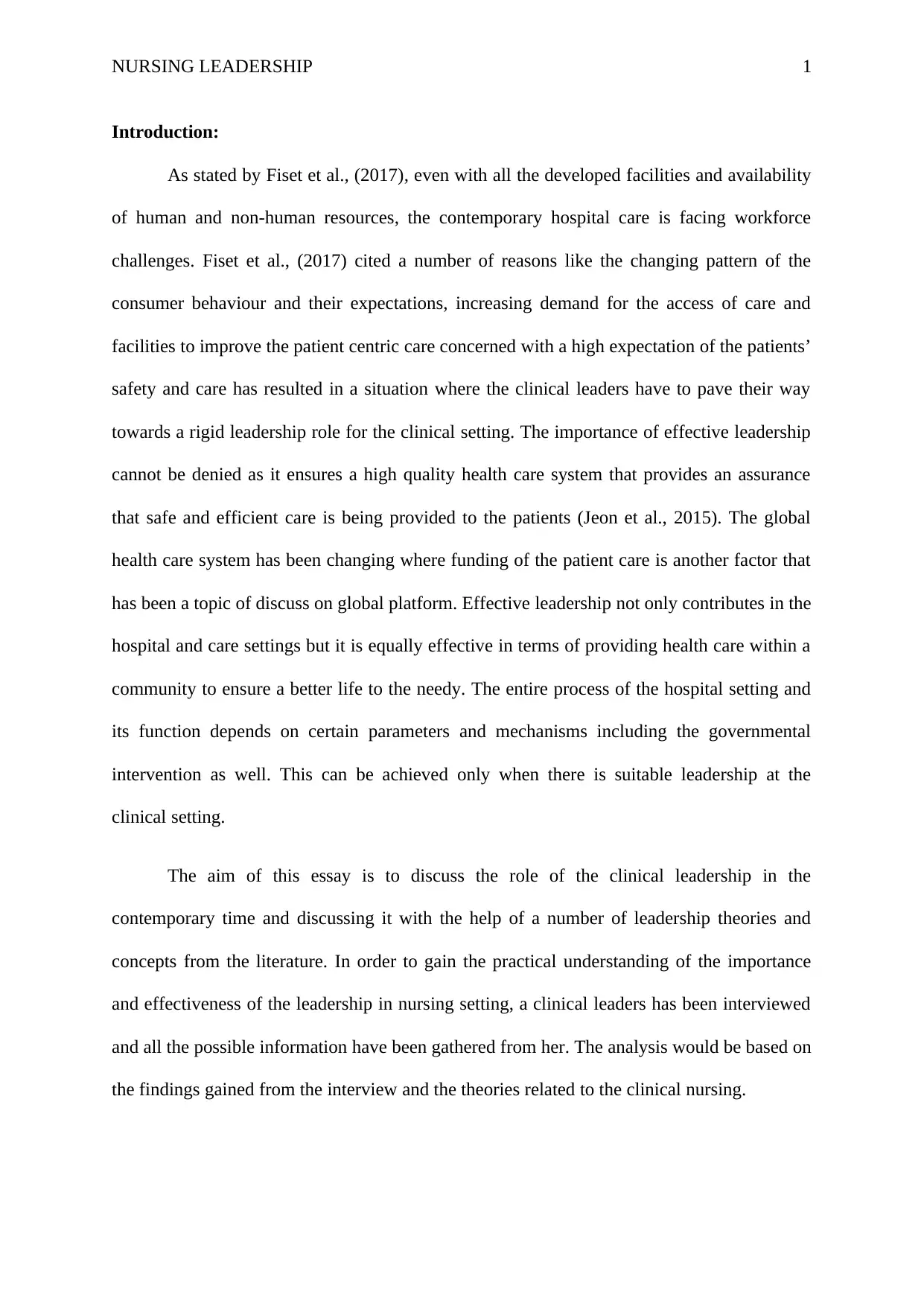
NURSING LEADERSHIP 1
Introduction:
As stated by Fiset et al., (2017), even with all the developed facilities and availability
of human and non-human resources, the contemporary hospital care is facing workforce
challenges. Fiset et al., (2017) cited a number of reasons like the changing pattern of the
consumer behaviour and their expectations, increasing demand for the access of care and
facilities to improve the patient centric care concerned with a high expectation of the patients’
safety and care has resulted in a situation where the clinical leaders have to pave their way
towards a rigid leadership role for the clinical setting. The importance of effective leadership
cannot be denied as it ensures a high quality health care system that provides an assurance
that safe and efficient care is being provided to the patients (Jeon et al., 2015). The global
health care system has been changing where funding of the patient care is another factor that
has been a topic of discuss on global platform. Effective leadership not only contributes in the
hospital and care settings but it is equally effective in terms of providing health care within a
community to ensure a better life to the needy. The entire process of the hospital setting and
its function depends on certain parameters and mechanisms including the governmental
intervention as well. This can be achieved only when there is suitable leadership at the
clinical setting.
The aim of this essay is to discuss the role of the clinical leadership in the
contemporary time and discussing it with the help of a number of leadership theories and
concepts from the literature. In order to gain the practical understanding of the importance
and effectiveness of the leadership in nursing setting, a clinical leaders has been interviewed
and all the possible information have been gathered from her. The analysis would be based on
the findings gained from the interview and the theories related to the clinical nursing.
Introduction:
As stated by Fiset et al., (2017), even with all the developed facilities and availability
of human and non-human resources, the contemporary hospital care is facing workforce
challenges. Fiset et al., (2017) cited a number of reasons like the changing pattern of the
consumer behaviour and their expectations, increasing demand for the access of care and
facilities to improve the patient centric care concerned with a high expectation of the patients’
safety and care has resulted in a situation where the clinical leaders have to pave their way
towards a rigid leadership role for the clinical setting. The importance of effective leadership
cannot be denied as it ensures a high quality health care system that provides an assurance
that safe and efficient care is being provided to the patients (Jeon et al., 2015). The global
health care system has been changing where funding of the patient care is another factor that
has been a topic of discuss on global platform. Effective leadership not only contributes in the
hospital and care settings but it is equally effective in terms of providing health care within a
community to ensure a better life to the needy. The entire process of the hospital setting and
its function depends on certain parameters and mechanisms including the governmental
intervention as well. This can be achieved only when there is suitable leadership at the
clinical setting.
The aim of this essay is to discuss the role of the clinical leadership in the
contemporary time and discussing it with the help of a number of leadership theories and
concepts from the literature. In order to gain the practical understanding of the importance
and effectiveness of the leadership in nursing setting, a clinical leaders has been interviewed
and all the possible information have been gathered from her. The analysis would be based on
the findings gained from the interview and the theories related to the clinical nursing.
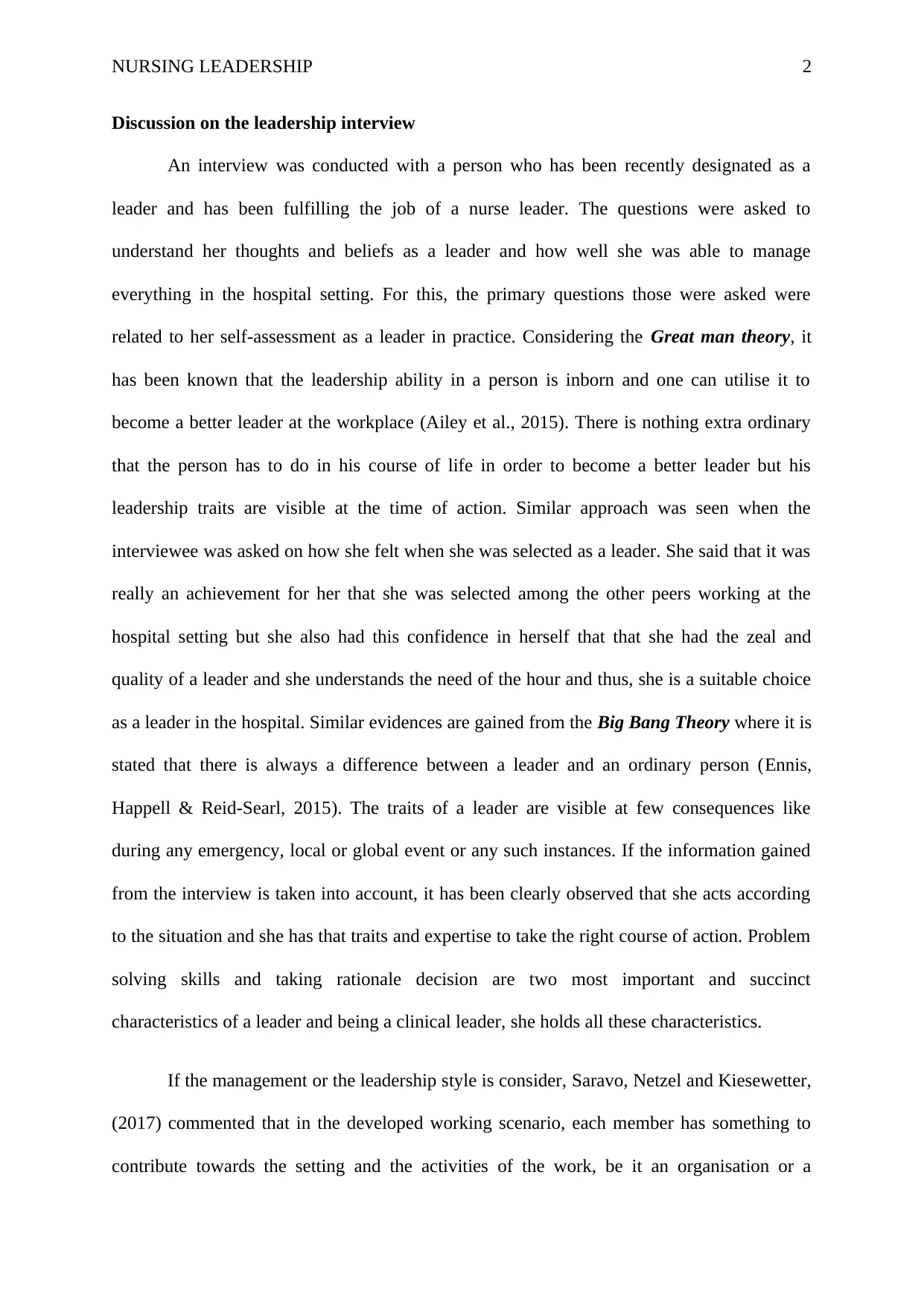
NURSING LEADERSHIP 2
Discussion on the leadership interview
An interview was conducted with a person who has been recently designated as a
leader and has been fulfilling the job of a nurse leader. The questions were asked to
understand her thoughts and beliefs as a leader and how well she was able to manage
everything in the hospital setting. For this, the primary questions those were asked were
related to her self-assessment as a leader in practice. Considering the Great man theory, it
has been known that the leadership ability in a person is inborn and one can utilise it to
become a better leader at the workplace (Ailey et al., 2015). There is nothing extra ordinary
that the person has to do in his course of life in order to become a better leader but his
leadership traits are visible at the time of action. Similar approach was seen when the
interviewee was asked on how she felt when she was selected as a leader. She said that it was
really an achievement for her that she was selected among the other peers working at the
hospital setting but she also had this confidence in herself that that she had the zeal and
quality of a leader and she understands the need of the hour and thus, she is a suitable choice
as a leader in the hospital. Similar evidences are gained from the Big Bang Theory where it is
stated that there is always a difference between a leader and an ordinary person (Ennis,
Happell & Reid‐Searl, 2015). The traits of a leader are visible at few consequences like
during any emergency, local or global event or any such instances. If the information gained
from the interview is taken into account, it has been clearly observed that she acts according
to the situation and she has that traits and expertise to take the right course of action. Problem
solving skills and taking rationale decision are two most important and succinct
characteristics of a leader and being a clinical leader, she holds all these characteristics.
If the management or the leadership style is consider, Saravo, Netzel and Kiesewetter,
(2017) commented that in the developed working scenario, each member has something to
contribute towards the setting and the activities of the work, be it an organisation or a
Discussion on the leadership interview
An interview was conducted with a person who has been recently designated as a
leader and has been fulfilling the job of a nurse leader. The questions were asked to
understand her thoughts and beliefs as a leader and how well she was able to manage
everything in the hospital setting. For this, the primary questions those were asked were
related to her self-assessment as a leader in practice. Considering the Great man theory, it
has been known that the leadership ability in a person is inborn and one can utilise it to
become a better leader at the workplace (Ailey et al., 2015). There is nothing extra ordinary
that the person has to do in his course of life in order to become a better leader but his
leadership traits are visible at the time of action. Similar approach was seen when the
interviewee was asked on how she felt when she was selected as a leader. She said that it was
really an achievement for her that she was selected among the other peers working at the
hospital setting but she also had this confidence in herself that that she had the zeal and
quality of a leader and she understands the need of the hour and thus, she is a suitable choice
as a leader in the hospital. Similar evidences are gained from the Big Bang Theory where it is
stated that there is always a difference between a leader and an ordinary person (Ennis,
Happell & Reid‐Searl, 2015). The traits of a leader are visible at few consequences like
during any emergency, local or global event or any such instances. If the information gained
from the interview is taken into account, it has been clearly observed that she acts according
to the situation and she has that traits and expertise to take the right course of action. Problem
solving skills and taking rationale decision are two most important and succinct
characteristics of a leader and being a clinical leader, she holds all these characteristics.
If the management or the leadership style is consider, Saravo, Netzel and Kiesewetter,
(2017) commented that in the developed working scenario, each member has something to
contribute towards the setting and the activities of the work, be it an organisation or a
⊘ This is a preview!⊘
Do you want full access?
Subscribe today to unlock all pages.

Trusted by 1+ million students worldwide
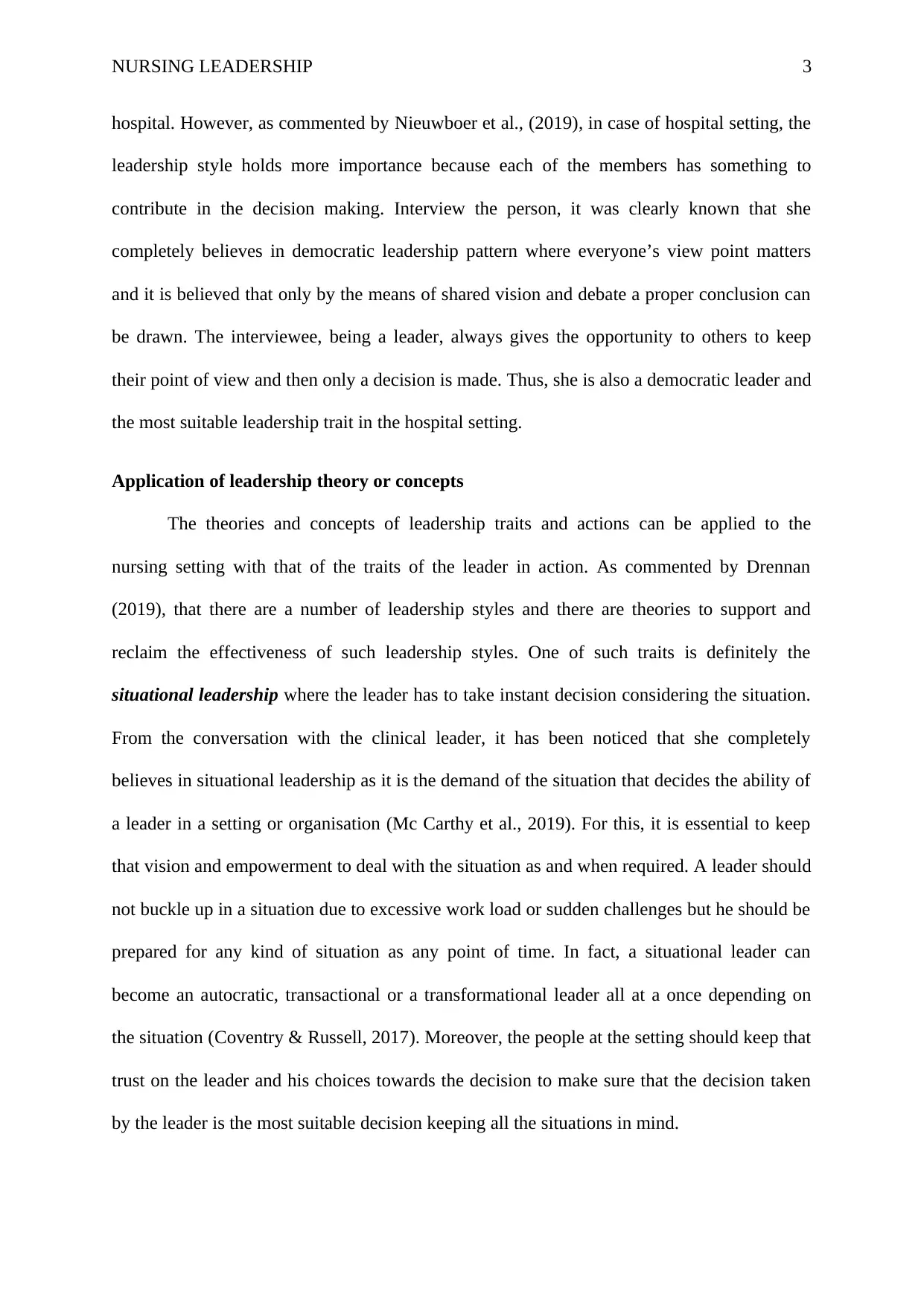
NURSING LEADERSHIP 3
hospital. However, as commented by Nieuwboer et al., (2019), in case of hospital setting, the
leadership style holds more importance because each of the members has something to
contribute in the decision making. Interview the person, it was clearly known that she
completely believes in democratic leadership pattern where everyone’s view point matters
and it is believed that only by the means of shared vision and debate a proper conclusion can
be drawn. The interviewee, being a leader, always gives the opportunity to others to keep
their point of view and then only a decision is made. Thus, she is also a democratic leader and
the most suitable leadership trait in the hospital setting.
Application of leadership theory or concepts
The theories and concepts of leadership traits and actions can be applied to the
nursing setting with that of the traits of the leader in action. As commented by Drennan
(2019), that there are a number of leadership styles and there are theories to support and
reclaim the effectiveness of such leadership styles. One of such traits is definitely the
situational leadership where the leader has to take instant decision considering the situation.
From the conversation with the clinical leader, it has been noticed that she completely
believes in situational leadership as it is the demand of the situation that decides the ability of
a leader in a setting or organisation (Mc Carthy et al., 2019). For this, it is essential to keep
that vision and empowerment to deal with the situation as and when required. A leader should
not buckle up in a situation due to excessive work load or sudden challenges but he should be
prepared for any kind of situation as any point of time. In fact, a situational leader can
become an autocratic, transactional or a transformational leader all at a once depending on
the situation (Coventry & Russell, 2017). Moreover, the people at the setting should keep that
trust on the leader and his choices towards the decision to make sure that the decision taken
by the leader is the most suitable decision keeping all the situations in mind.
hospital. However, as commented by Nieuwboer et al., (2019), in case of hospital setting, the
leadership style holds more importance because each of the members has something to
contribute in the decision making. Interview the person, it was clearly known that she
completely believes in democratic leadership pattern where everyone’s view point matters
and it is believed that only by the means of shared vision and debate a proper conclusion can
be drawn. The interviewee, being a leader, always gives the opportunity to others to keep
their point of view and then only a decision is made. Thus, she is also a democratic leader and
the most suitable leadership trait in the hospital setting.
Application of leadership theory or concepts
The theories and concepts of leadership traits and actions can be applied to the
nursing setting with that of the traits of the leader in action. As commented by Drennan
(2019), that there are a number of leadership styles and there are theories to support and
reclaim the effectiveness of such leadership styles. One of such traits is definitely the
situational leadership where the leader has to take instant decision considering the situation.
From the conversation with the clinical leader, it has been noticed that she completely
believes in situational leadership as it is the demand of the situation that decides the ability of
a leader in a setting or organisation (Mc Carthy et al., 2019). For this, it is essential to keep
that vision and empowerment to deal with the situation as and when required. A leader should
not buckle up in a situation due to excessive work load or sudden challenges but he should be
prepared for any kind of situation as any point of time. In fact, a situational leader can
become an autocratic, transactional or a transformational leader all at a once depending on
the situation (Coventry & Russell, 2017). Moreover, the people at the setting should keep that
trust on the leader and his choices towards the decision to make sure that the decision taken
by the leader is the most suitable decision keeping all the situations in mind.
Paraphrase This Document
Need a fresh take? Get an instant paraphrase of this document with our AI Paraphraser
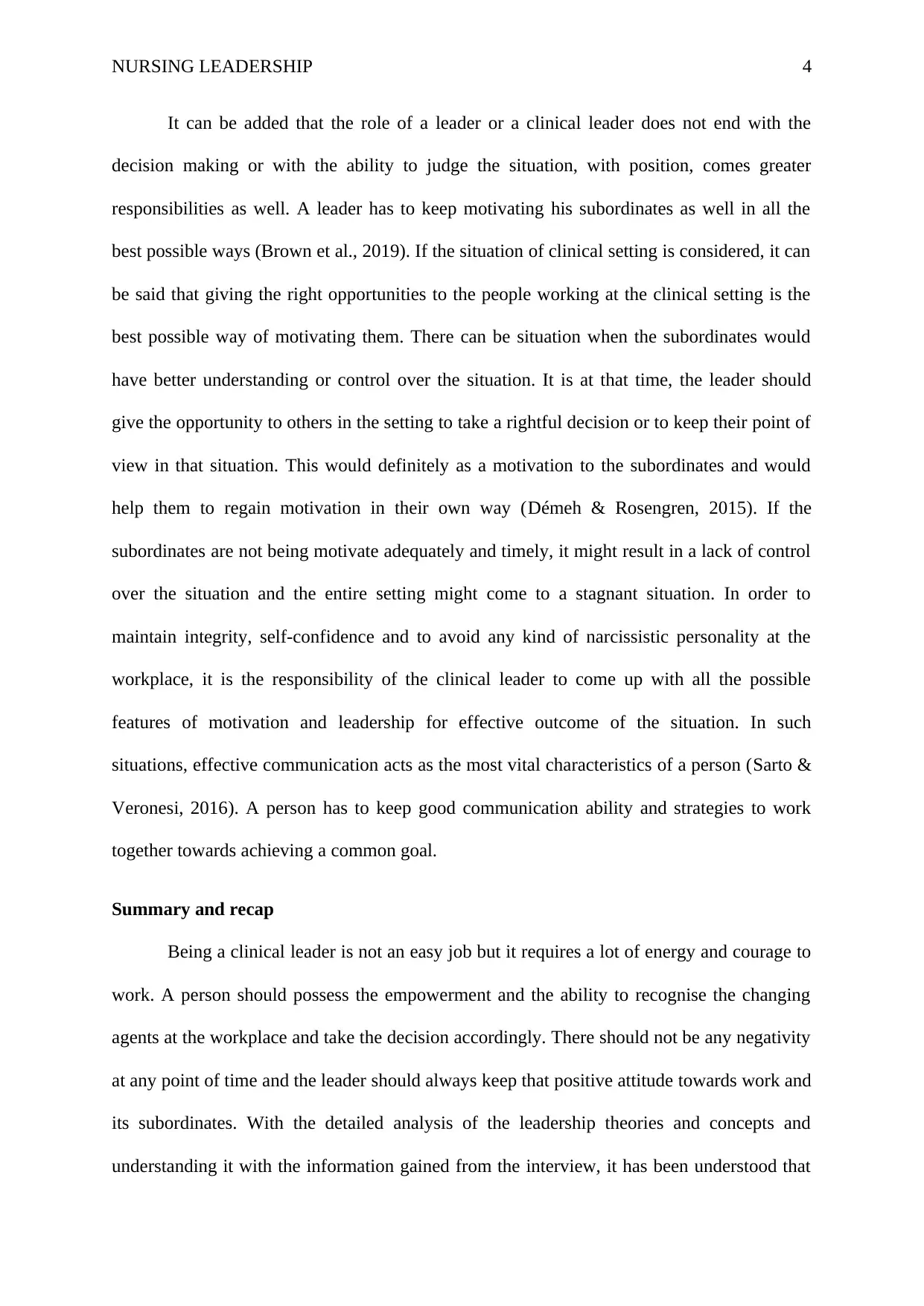
NURSING LEADERSHIP 4
It can be added that the role of a leader or a clinical leader does not end with the
decision making or with the ability to judge the situation, with position, comes greater
responsibilities as well. A leader has to keep motivating his subordinates as well in all the
best possible ways (Brown et al., 2019). If the situation of clinical setting is considered, it can
be said that giving the right opportunities to the people working at the clinical setting is the
best possible way of motivating them. There can be situation when the subordinates would
have better understanding or control over the situation. It is at that time, the leader should
give the opportunity to others in the setting to take a rightful decision or to keep their point of
view in that situation. This would definitely as a motivation to the subordinates and would
help them to regain motivation in their own way (Démeh & Rosengren, 2015). If the
subordinates are not being motivate adequately and timely, it might result in a lack of control
over the situation and the entire setting might come to a stagnant situation. In order to
maintain integrity, self-confidence and to avoid any kind of narcissistic personality at the
workplace, it is the responsibility of the clinical leader to come up with all the possible
features of motivation and leadership for effective outcome of the situation. In such
situations, effective communication acts as the most vital characteristics of a person (Sarto &
Veronesi, 2016). A person has to keep good communication ability and strategies to work
together towards achieving a common goal.
Summary and recap
Being a clinical leader is not an easy job but it requires a lot of energy and courage to
work. A person should possess the empowerment and the ability to recognise the changing
agents at the workplace and take the decision accordingly. There should not be any negativity
at any point of time and the leader should always keep that positive attitude towards work and
its subordinates. With the detailed analysis of the leadership theories and concepts and
understanding it with the information gained from the interview, it has been understood that
It can be added that the role of a leader or a clinical leader does not end with the
decision making or with the ability to judge the situation, with position, comes greater
responsibilities as well. A leader has to keep motivating his subordinates as well in all the
best possible ways (Brown et al., 2019). If the situation of clinical setting is considered, it can
be said that giving the right opportunities to the people working at the clinical setting is the
best possible way of motivating them. There can be situation when the subordinates would
have better understanding or control over the situation. It is at that time, the leader should
give the opportunity to others in the setting to take a rightful decision or to keep their point of
view in that situation. This would definitely as a motivation to the subordinates and would
help them to regain motivation in their own way (Démeh & Rosengren, 2015). If the
subordinates are not being motivate adequately and timely, it might result in a lack of control
over the situation and the entire setting might come to a stagnant situation. In order to
maintain integrity, self-confidence and to avoid any kind of narcissistic personality at the
workplace, it is the responsibility of the clinical leader to come up with all the possible
features of motivation and leadership for effective outcome of the situation. In such
situations, effective communication acts as the most vital characteristics of a person (Sarto &
Veronesi, 2016). A person has to keep good communication ability and strategies to work
together towards achieving a common goal.
Summary and recap
Being a clinical leader is not an easy job but it requires a lot of energy and courage to
work. A person should possess the empowerment and the ability to recognise the changing
agents at the workplace and take the decision accordingly. There should not be any negativity
at any point of time and the leader should always keep that positive attitude towards work and
its subordinates. With the detailed analysis of the leadership theories and concepts and
understanding it with the information gained from the interview, it has been understood that
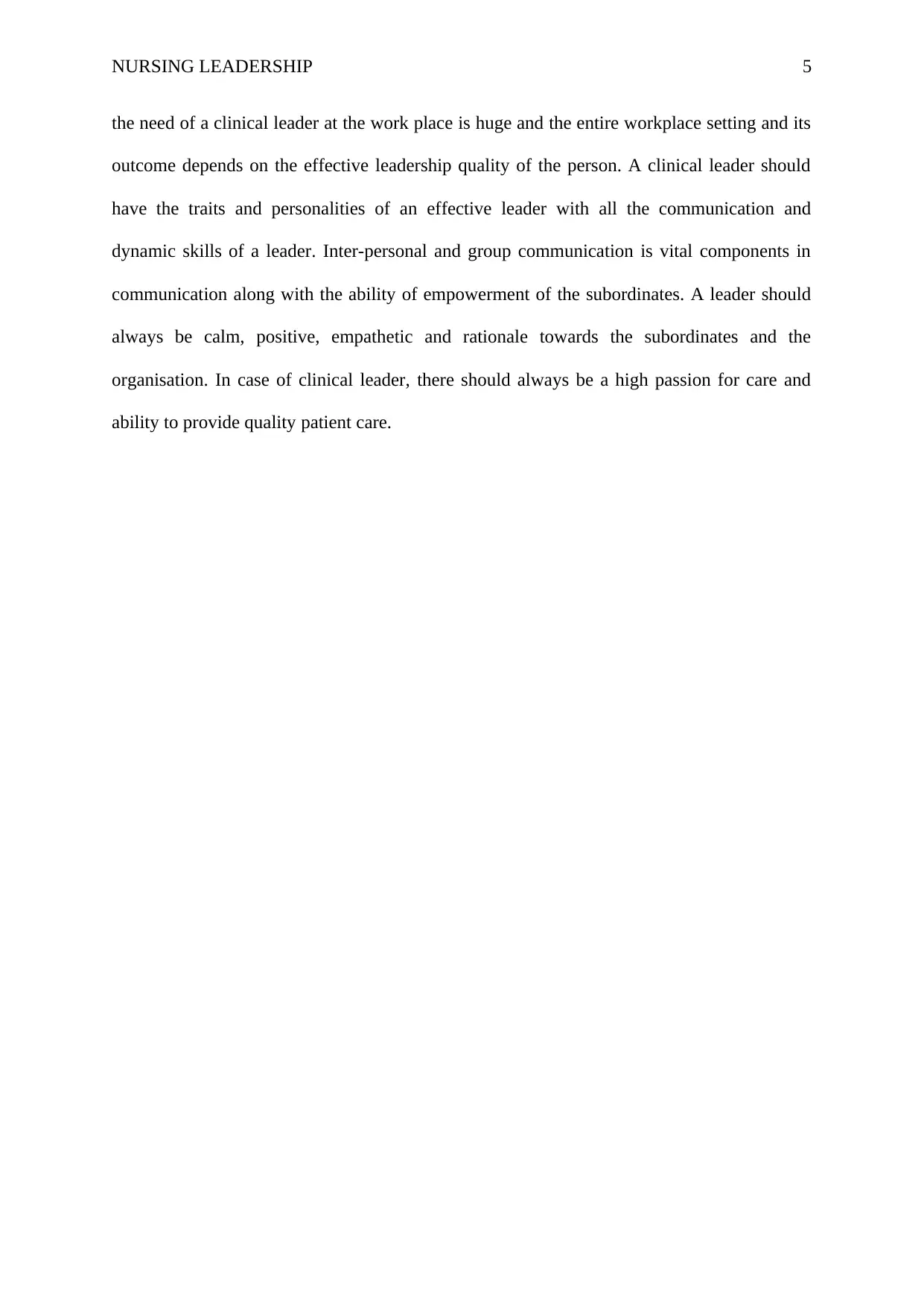
NURSING LEADERSHIP 5
the need of a clinical leader at the work place is huge and the entire workplace setting and its
outcome depends on the effective leadership quality of the person. A clinical leader should
have the traits and personalities of an effective leader with all the communication and
dynamic skills of a leader. Inter-personal and group communication is vital components in
communication along with the ability of empowerment of the subordinates. A leader should
always be calm, positive, empathetic and rationale towards the subordinates and the
organisation. In case of clinical leader, there should always be a high passion for care and
ability to provide quality patient care.
the need of a clinical leader at the work place is huge and the entire workplace setting and its
outcome depends on the effective leadership quality of the person. A clinical leader should
have the traits and personalities of an effective leader with all the communication and
dynamic skills of a leader. Inter-personal and group communication is vital components in
communication along with the ability of empowerment of the subordinates. A leader should
always be calm, positive, empathetic and rationale towards the subordinates and the
organisation. In case of clinical leader, there should always be a high passion for care and
ability to provide quality patient care.
⊘ This is a preview!⊘
Do you want full access?
Subscribe today to unlock all pages.

Trusted by 1+ million students worldwide
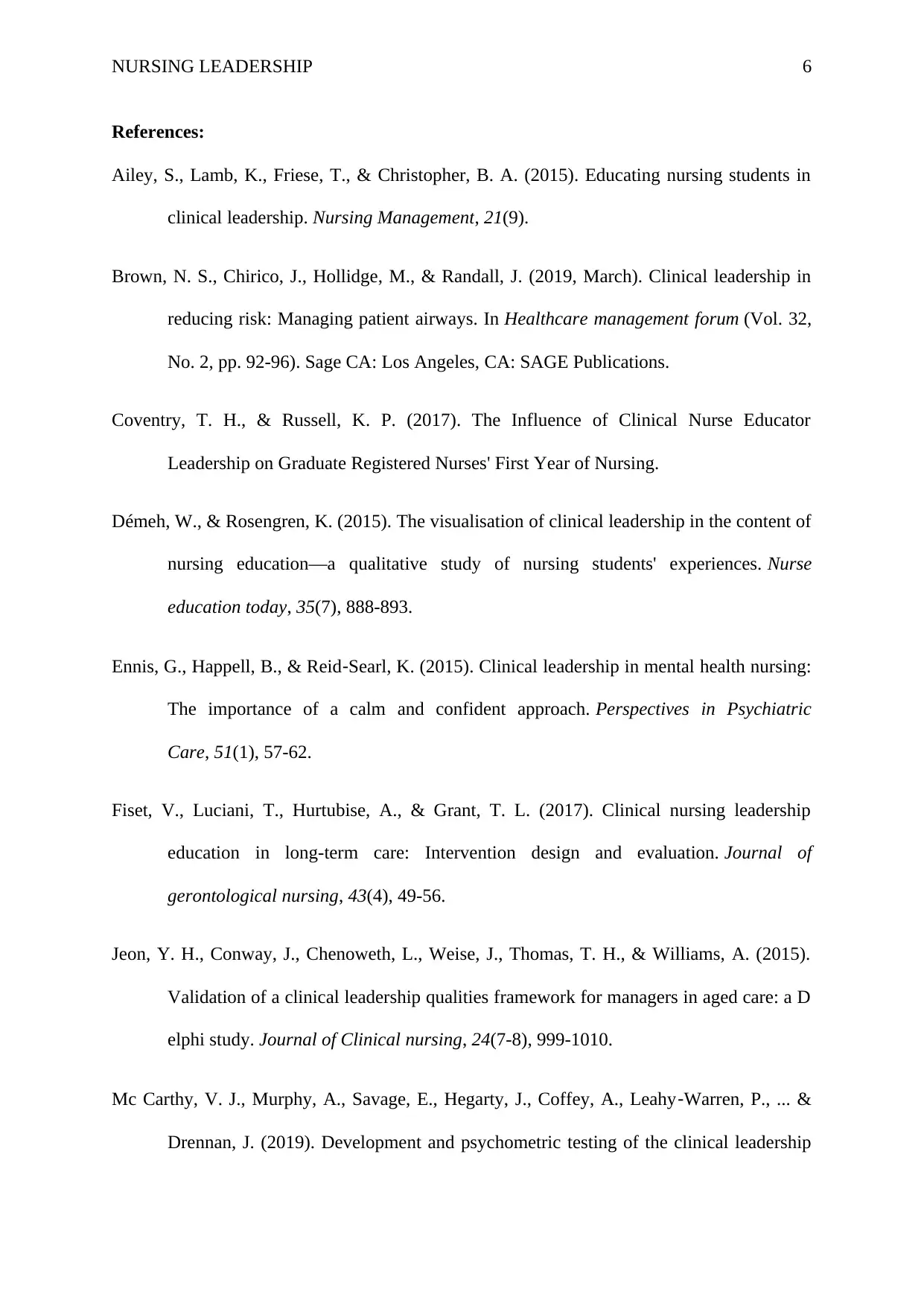
NURSING LEADERSHIP 6
References:
Ailey, S., Lamb, K., Friese, T., & Christopher, B. A. (2015). Educating nursing students in
clinical leadership. Nursing Management, 21(9).
Brown, N. S., Chirico, J., Hollidge, M., & Randall, J. (2019, March). Clinical leadership in
reducing risk: Managing patient airways. In Healthcare management forum (Vol. 32,
No. 2, pp. 92-96). Sage CA: Los Angeles, CA: SAGE Publications.
Coventry, T. H., & Russell, K. P. (2017). The Influence of Clinical Nurse Educator
Leadership on Graduate Registered Nurses' First Year of Nursing.
Démeh, W., & Rosengren, K. (2015). The visualisation of clinical leadership in the content of
nursing education—a qualitative study of nursing students' experiences. Nurse
education today, 35(7), 888-893.
Ennis, G., Happell, B., & Reid‐Searl, K. (2015). Clinical leadership in mental health nursing:
The importance of a calm and confident approach. Perspectives in Psychiatric
Care, 51(1), 57-62.
Fiset, V., Luciani, T., Hurtubise, A., & Grant, T. L. (2017). Clinical nursing leadership
education in long-term care: Intervention design and evaluation. Journal of
gerontological nursing, 43(4), 49-56.
Jeon, Y. H., Conway, J., Chenoweth, L., Weise, J., Thomas, T. H., & Williams, A. (2015).
Validation of a clinical leadership qualities framework for managers in aged care: a D
elphi study. Journal of Clinical nursing, 24(7-8), 999-1010.
Mc Carthy, V. J., Murphy, A., Savage, E., Hegarty, J., Coffey, A., Leahy‐Warren, P., ... &
Drennan, J. (2019). Development and psychometric testing of the clinical leadership
References:
Ailey, S., Lamb, K., Friese, T., & Christopher, B. A. (2015). Educating nursing students in
clinical leadership. Nursing Management, 21(9).
Brown, N. S., Chirico, J., Hollidge, M., & Randall, J. (2019, March). Clinical leadership in
reducing risk: Managing patient airways. In Healthcare management forum (Vol. 32,
No. 2, pp. 92-96). Sage CA: Los Angeles, CA: SAGE Publications.
Coventry, T. H., & Russell, K. P. (2017). The Influence of Clinical Nurse Educator
Leadership on Graduate Registered Nurses' First Year of Nursing.
Démeh, W., & Rosengren, K. (2015). The visualisation of clinical leadership in the content of
nursing education—a qualitative study of nursing students' experiences. Nurse
education today, 35(7), 888-893.
Ennis, G., Happell, B., & Reid‐Searl, K. (2015). Clinical leadership in mental health nursing:
The importance of a calm and confident approach. Perspectives in Psychiatric
Care, 51(1), 57-62.
Fiset, V., Luciani, T., Hurtubise, A., & Grant, T. L. (2017). Clinical nursing leadership
education in long-term care: Intervention design and evaluation. Journal of
gerontological nursing, 43(4), 49-56.
Jeon, Y. H., Conway, J., Chenoweth, L., Weise, J., Thomas, T. H., & Williams, A. (2015).
Validation of a clinical leadership qualities framework for managers in aged care: a D
elphi study. Journal of Clinical nursing, 24(7-8), 999-1010.
Mc Carthy, V. J., Murphy, A., Savage, E., Hegarty, J., Coffey, A., Leahy‐Warren, P., ... &
Drennan, J. (2019). Development and psychometric testing of the clinical leadership
Paraphrase This Document
Need a fresh take? Get an instant paraphrase of this document with our AI Paraphraser
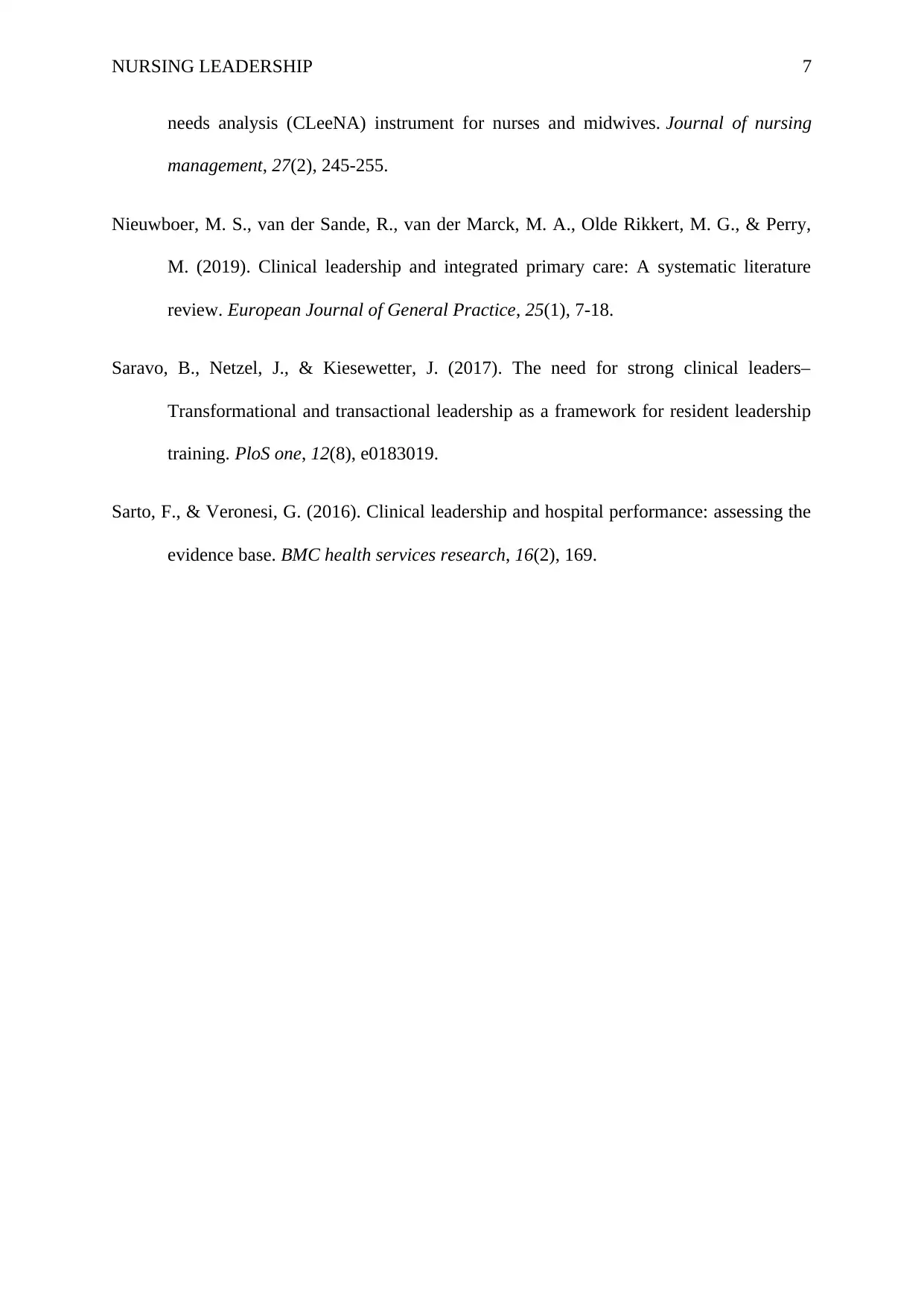
NURSING LEADERSHIP 7
needs analysis (CLeeNA) instrument for nurses and midwives. Journal of nursing
management, 27(2), 245-255.
Nieuwboer, M. S., van der Sande, R., van der Marck, M. A., Olde Rikkert, M. G., & Perry,
M. (2019). Clinical leadership and integrated primary care: A systematic literature
review. European Journal of General Practice, 25(1), 7-18.
Saravo, B., Netzel, J., & Kiesewetter, J. (2017). The need for strong clinical leaders–
Transformational and transactional leadership as a framework for resident leadership
training. PloS one, 12(8), e0183019.
Sarto, F., & Veronesi, G. (2016). Clinical leadership and hospital performance: assessing the
evidence base. BMC health services research, 16(2), 169.
needs analysis (CLeeNA) instrument for nurses and midwives. Journal of nursing
management, 27(2), 245-255.
Nieuwboer, M. S., van der Sande, R., van der Marck, M. A., Olde Rikkert, M. G., & Perry,
M. (2019). Clinical leadership and integrated primary care: A systematic literature
review. European Journal of General Practice, 25(1), 7-18.
Saravo, B., Netzel, J., & Kiesewetter, J. (2017). The need for strong clinical leaders–
Transformational and transactional leadership as a framework for resident leadership
training. PloS one, 12(8), e0183019.
Sarto, F., & Veronesi, G. (2016). Clinical leadership and hospital performance: assessing the
evidence base. BMC health services research, 16(2), 169.
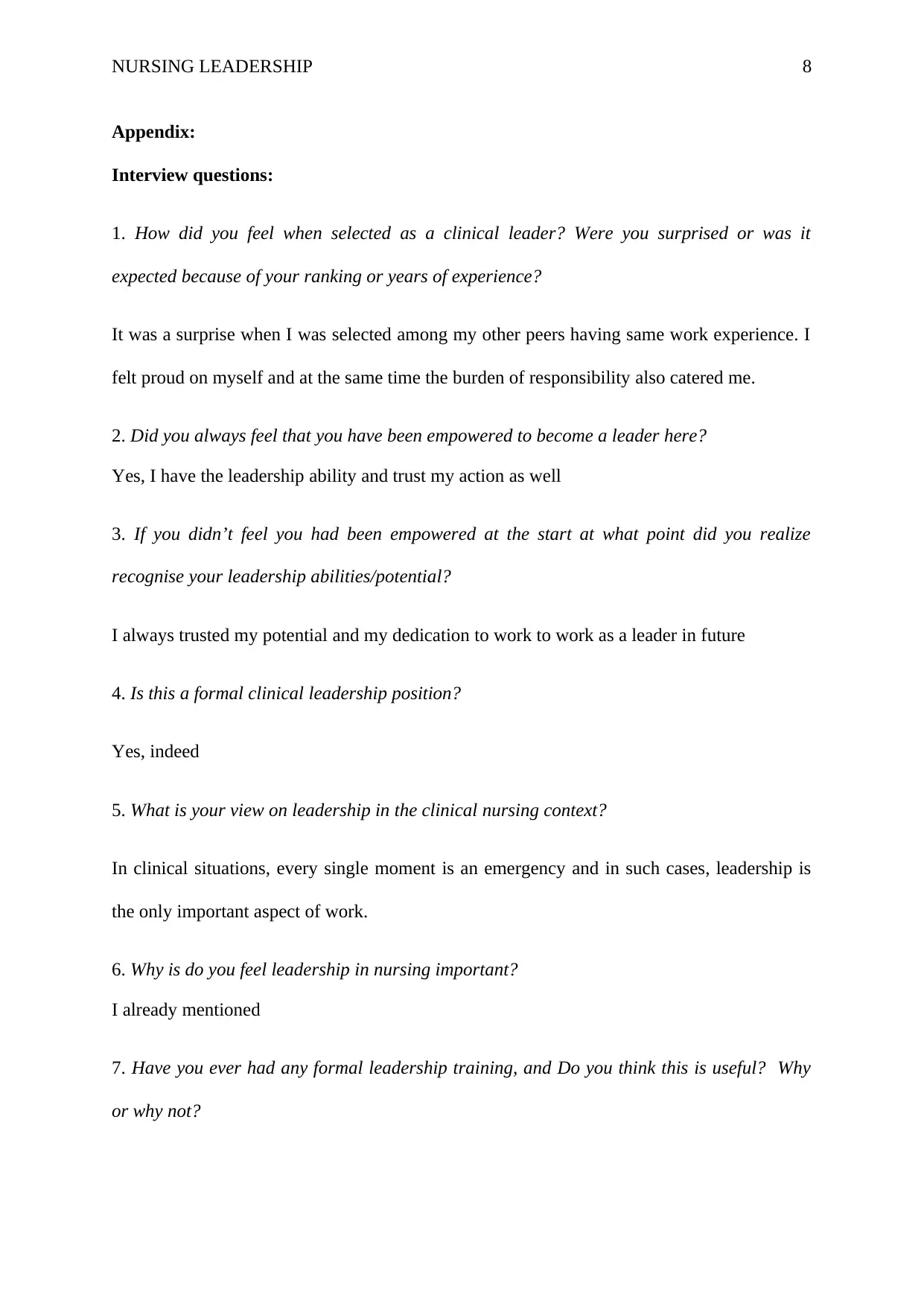
NURSING LEADERSHIP 8
Appendix:
Interview questions:
1. How did you feel when selected as a clinical leader? Were you surprised or was it
expected because of your ranking or years of experience?
It was a surprise when I was selected among my other peers having same work experience. I
felt proud on myself and at the same time the burden of responsibility also catered me.
2. Did you always feel that you have been empowered to become a leader here?
Yes, I have the leadership ability and trust my action as well
3. If you didn’t feel you had been empowered at the start at what point did you realize
recognise your leadership abilities/potential?
I always trusted my potential and my dedication to work to work as a leader in future
4. Is this a formal clinical leadership position?
Yes, indeed
5. What is your view on leadership in the clinical nursing context?
In clinical situations, every single moment is an emergency and in such cases, leadership is
the only important aspect of work.
6. Why is do you feel leadership in nursing important?
I already mentioned
7. Have you ever had any formal leadership training, and Do you think this is useful? Why
or why not?
Appendix:
Interview questions:
1. How did you feel when selected as a clinical leader? Were you surprised or was it
expected because of your ranking or years of experience?
It was a surprise when I was selected among my other peers having same work experience. I
felt proud on myself and at the same time the burden of responsibility also catered me.
2. Did you always feel that you have been empowered to become a leader here?
Yes, I have the leadership ability and trust my action as well
3. If you didn’t feel you had been empowered at the start at what point did you realize
recognise your leadership abilities/potential?
I always trusted my potential and my dedication to work to work as a leader in future
4. Is this a formal clinical leadership position?
Yes, indeed
5. What is your view on leadership in the clinical nursing context?
In clinical situations, every single moment is an emergency and in such cases, leadership is
the only important aspect of work.
6. Why is do you feel leadership in nursing important?
I already mentioned
7. Have you ever had any formal leadership training, and Do you think this is useful? Why
or why not?
⊘ This is a preview!⊘
Do you want full access?
Subscribe today to unlock all pages.

Trusted by 1+ million students worldwide
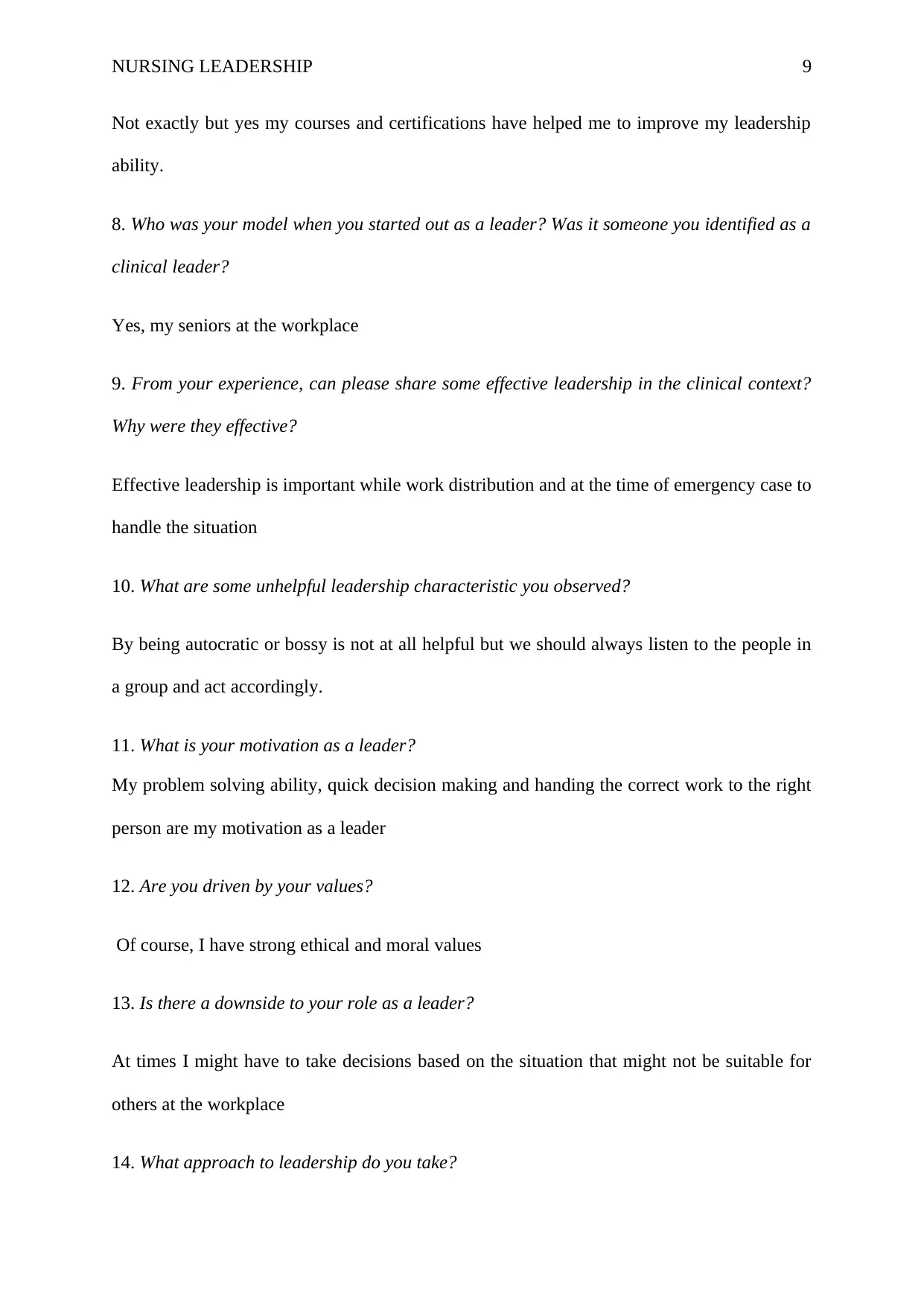
NURSING LEADERSHIP 9
Not exactly but yes my courses and certifications have helped me to improve my leadership
ability.
8. Who was your model when you started out as a leader? Was it someone you identified as a
clinical leader?
Yes, my seniors at the workplace
9. From your experience, can please share some effective leadership in the clinical context?
Why were they effective?
Effective leadership is important while work distribution and at the time of emergency case to
handle the situation
10. What are some unhelpful leadership characteristic you observed?
By being autocratic or bossy is not at all helpful but we should always listen to the people in
a group and act accordingly.
11. What is your motivation as a leader?
My problem solving ability, quick decision making and handing the correct work to the right
person are my motivation as a leader
12. Are you driven by your values?
Of course, I have strong ethical and moral values
13. Is there a downside to your role as a leader?
At times I might have to take decisions based on the situation that might not be suitable for
others at the workplace
14. What approach to leadership do you take?
Not exactly but yes my courses and certifications have helped me to improve my leadership
ability.
8. Who was your model when you started out as a leader? Was it someone you identified as a
clinical leader?
Yes, my seniors at the workplace
9. From your experience, can please share some effective leadership in the clinical context?
Why were they effective?
Effective leadership is important while work distribution and at the time of emergency case to
handle the situation
10. What are some unhelpful leadership characteristic you observed?
By being autocratic or bossy is not at all helpful but we should always listen to the people in
a group and act accordingly.
11. What is your motivation as a leader?
My problem solving ability, quick decision making and handing the correct work to the right
person are my motivation as a leader
12. Are you driven by your values?
Of course, I have strong ethical and moral values
13. Is there a downside to your role as a leader?
At times I might have to take decisions based on the situation that might not be suitable for
others at the workplace
14. What approach to leadership do you take?
Paraphrase This Document
Need a fresh take? Get an instant paraphrase of this document with our AI Paraphraser
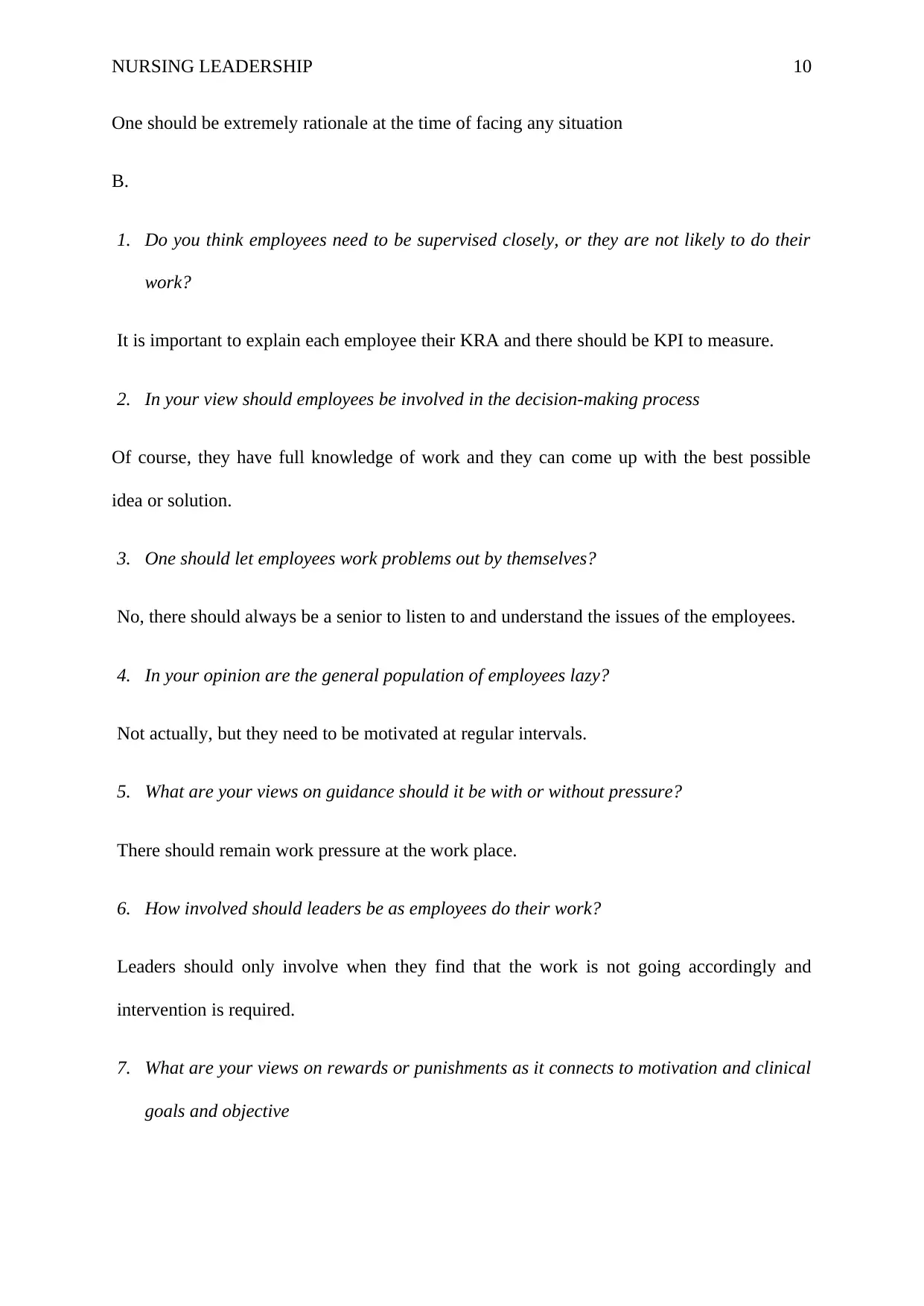
NURSING LEADERSHIP 10
One should be extremely rationale at the time of facing any situation
B.
1. Do you think employees need to be supervised closely, or they are not likely to do their
work?
It is important to explain each employee their KRA and there should be KPI to measure.
2. In your view should employees be involved in the decision-making process
Of course, they have full knowledge of work and they can come up with the best possible
idea or solution.
3. One should let employees work problems out by themselves?
No, there should always be a senior to listen to and understand the issues of the employees.
4. In your opinion are the general population of employees lazy?
Not actually, but they need to be motivated at regular intervals.
5. What are your views on guidance should it be with or without pressure?
There should remain work pressure at the work place.
6. How involved should leaders be as employees do their work?
Leaders should only involve when they find that the work is not going accordingly and
intervention is required.
7. What are your views on rewards or punishments as it connects to motivation and clinical
goals and objective
One should be extremely rationale at the time of facing any situation
B.
1. Do you think employees need to be supervised closely, or they are not likely to do their
work?
It is important to explain each employee their KRA and there should be KPI to measure.
2. In your view should employees be involved in the decision-making process
Of course, they have full knowledge of work and they can come up with the best possible
idea or solution.
3. One should let employees work problems out by themselves?
No, there should always be a senior to listen to and understand the issues of the employees.
4. In your opinion are the general population of employees lazy?
Not actually, but they need to be motivated at regular intervals.
5. What are your views on guidance should it be with or without pressure?
There should remain work pressure at the work place.
6. How involved should leaders be as employees do their work?
Leaders should only involve when they find that the work is not going accordingly and
intervention is required.
7. What are your views on rewards or punishments as it connects to motivation and clinical
goals and objective
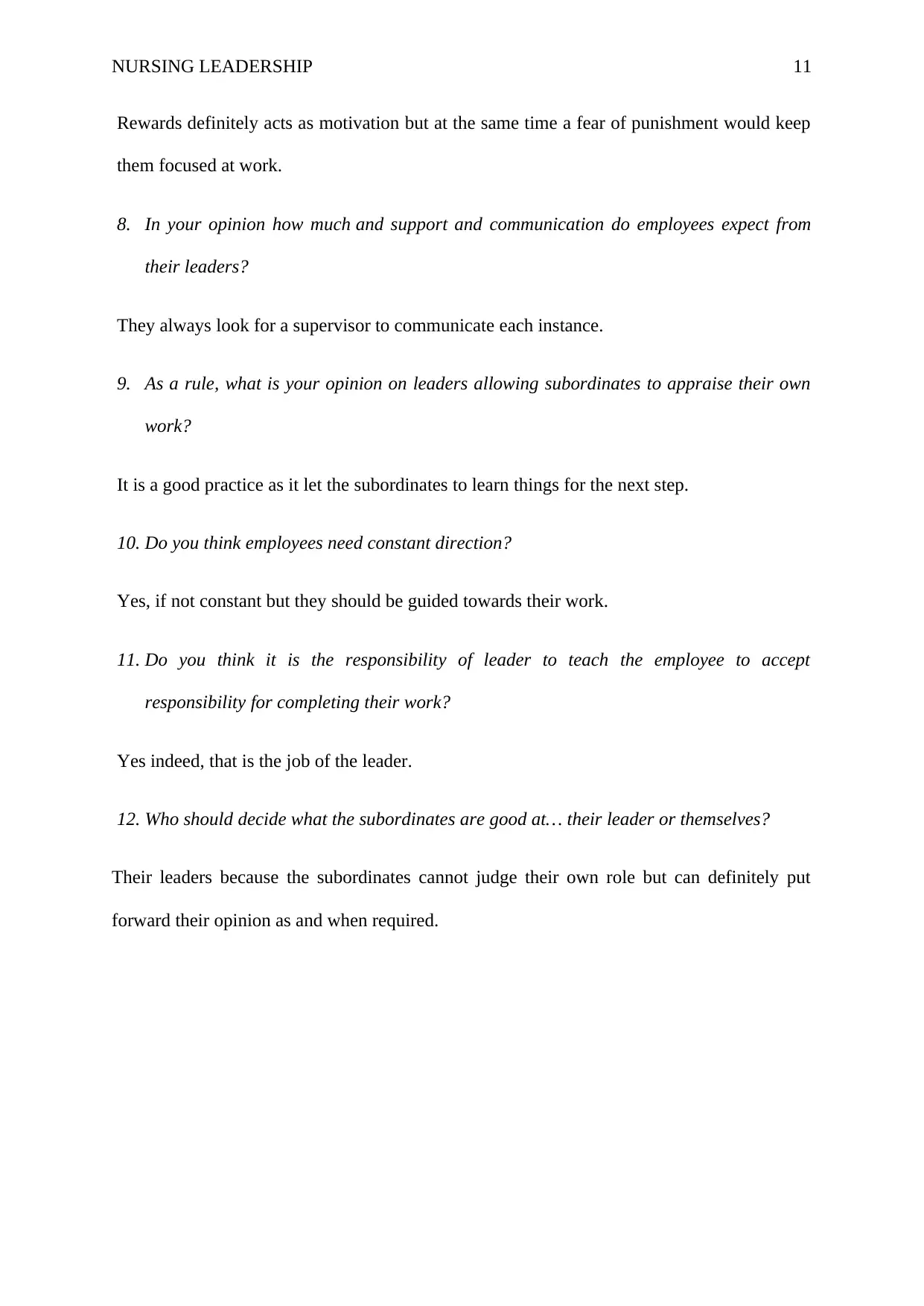
NURSING LEADERSHIP 11
Rewards definitely acts as motivation but at the same time a fear of punishment would keep
them focused at work.
8. In your opinion how much and support and communication do employees expect from
their leaders?
They always look for a supervisor to communicate each instance.
9. As a rule, what is your opinion on leaders allowing subordinates to appraise their own
work?
It is a good practice as it let the subordinates to learn things for the next step.
10. Do you think employees need constant direction?
Yes, if not constant but they should be guided towards their work.
11. Do you think it is the responsibility of leader to teach the employee to accept
responsibility for completing their work?
Yes indeed, that is the job of the leader.
12. Who should decide what the subordinates are good at… their leader or themselves?
Their leaders because the subordinates cannot judge their own role but can definitely put
forward their opinion as and when required.
Rewards definitely acts as motivation but at the same time a fear of punishment would keep
them focused at work.
8. In your opinion how much and support and communication do employees expect from
their leaders?
They always look for a supervisor to communicate each instance.
9. As a rule, what is your opinion on leaders allowing subordinates to appraise their own
work?
It is a good practice as it let the subordinates to learn things for the next step.
10. Do you think employees need constant direction?
Yes, if not constant but they should be guided towards their work.
11. Do you think it is the responsibility of leader to teach the employee to accept
responsibility for completing their work?
Yes indeed, that is the job of the leader.
12. Who should decide what the subordinates are good at… their leader or themselves?
Their leaders because the subordinates cannot judge their own role but can definitely put
forward their opinion as and when required.
⊘ This is a preview!⊘
Do you want full access?
Subscribe today to unlock all pages.

Trusted by 1+ million students worldwide
1 out of 12
Related Documents
Your All-in-One AI-Powered Toolkit for Academic Success.
+13062052269
info@desklib.com
Available 24*7 on WhatsApp / Email
![[object Object]](/_next/static/media/star-bottom.7253800d.svg)
Unlock your academic potential
Copyright © 2020–2025 A2Z Services. All Rights Reserved. Developed and managed by ZUCOL.




